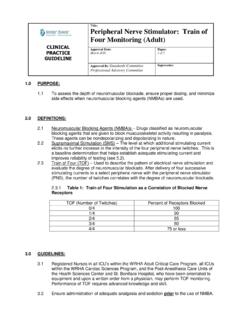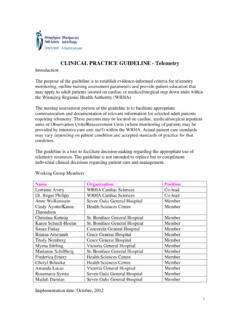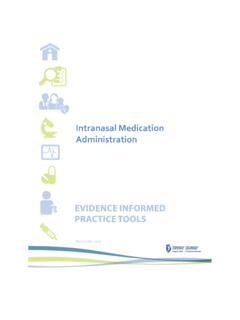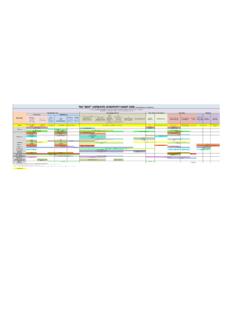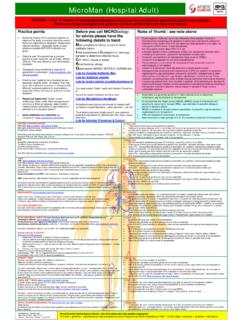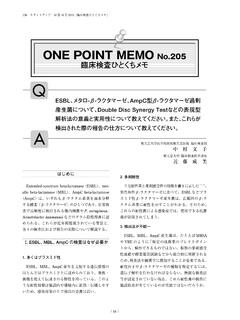Transcription of ESBL Frequently Asked Questions (FAQ) for Staff
1 Adapted from the University Health Network 1 esbl Frequently Asked Questions (FAQ) for Staff Colonization: refers to bacteria present on or in a person s body without causing illness. Everybody is colonized with many different kinds of bacteria and usually do not become ill from them Infection: is when a person becomes ill from specific bacteria Surveillance/Tracking: close watch kept over something extended spectrum Beta-Lactamase ( esbl ): An enzyme produced by some types of bacteria which can cause certain antibiotics not to work What is esbl ?
2 Our bodies are colonized by many different types of bacteria at all times, only some of which can be harmful to us. esbl producing bacteria are a certain group of bugs that produce the enzyme esbl , making some antibiotics ineffective. Most people s immune system is able to fight an infection caused by an esbl producing bacteria. How have we been approaching esbl positive patients up until now? In the past, the WRHA flagged those patients who became esbl positive. If positive, patients were placed on Contact Precautions for the duration of their stay.
3 Those providing direct care (visitors or Staff ) were required to wear gowns and gloves in the room. In some facilities these precautions were modified. Why is the WRHA changing these procedures? National evidence gathered shows, while esbl -producing bacteria can live in the health care environment, there have been very few outbreaks caused by esbl . When esbl positive bacteria were first discovered, there was a fear it might cause massive outbreaks in health care facilities. Fortunately, we now know this is not the case. We also know patients in isolation are more likely to get depressed, are visited less often by healthcare providers, and are more likely to experience medical errors.
4 Adapted from the University Health Network 2 When we balance all of these factors together, we feel it is better for our patients that we change our current practices and treat esbl -producing bacteria like other bacteria, using Routine Practices. This will allow us to focus our efforts on more dangerous bacteria. Will this change put patients at risk? No. We will continue to work on excellent infection prevention and control standards for all patients. We will continue to treat esbl infections quickly and appropriately. If we see concerning trends of increased infections or evidence of an outbreak occurring then we will take quick and appropriate action.
5 How will I know if someone has an esbl infection? Because esbl is discovered on clinical specimen ( , urine cultures), you will still know when an infection occurs due to an esbl -producing bacteria. Patients that we know are carrying esbl -producing bacteria will no longer require isolation or Contact Precautions. You may know the esbl status of patients who are already/currently flagged in the EPR system. Disregard the esbl flags. Though they are present, these patients no longer require Contact Precautions within the WRHA. In terms of Staff safety, esbl causes very few infections in patients and is not an organism that generally affects health-care providers.
6 How will I be able to protect myself from esbl ? By following Routine Practices, including excellent hand hygiene (following the 4 Moments) you will be able to protect yourself if a patient is carrying ANY organism. We will also maintain focus on appropriate environmental cleaning standards to protect patients and health-care providers from being exposed to organisms. Are we concerned about the spread of esbl and potentially causing further outbreaks? While esbl -producing bacteria can live in the environment the healthcare environment has rarely been involved in outbreaks.
7 The prevention of transmission of these bacteria requires following Routine Practices. Stopping esbl control measures will allow us to focus more resources on other hospital-associated infections that have proven to cause much more harm in patients. Adapted from the University Health Network 3 How do I know if I get esbl ? As a healthy individual living in the community, your risk of having esbl is very low. Even if you do carry esbl , your chances of getting ill from it are extremely low. For these reasons, the WRHA has never screened healthcare providers for esbl .
8 We do not plan to start testing health care providers now. Now that esbl patients are being placed in semi and quad rooms will that increase transmission of esbl and lead to more infections? Following Routine Practices, including cleaning equipment between patient uses and performing the Four Moments of Hand Hygiene, should result in the reduction of all organism transmission. Organisms are transmitted between patients all the time, but most are relatively benign: esbl is now known to be in this category. We only try to control certain organisms we know can cause serious illness ( , MRSA, influenza, etc.)
9 Should we be placing known esbl positive patients in the same room rather than putting them in shared rooms with non- esbl patients? No. We will not be doing anything special for patients we know to be esbl positive previously. They will be treated like any other patient and will not be cohorted in the same room. What should we do with patients transferred to us on isolation for esbl ? Patients who arrive isolated from other facilities/RHAs will not be isolated in the WRHA. esbl positive patients may find this confusing so it will be important to provide them with information about this.
10 If you require more information please contact your site Infection Control Professional (ICP). If esbl is found on a clinical culture report, do we isolate? No. We treat it like any other clinical specimen. Do we restrict visitors for known esbl positive patients? No. These patients will no longer be on isolation therefore there is no need for visitor restrictions. Please see esbl Patient & Family Q&A.



